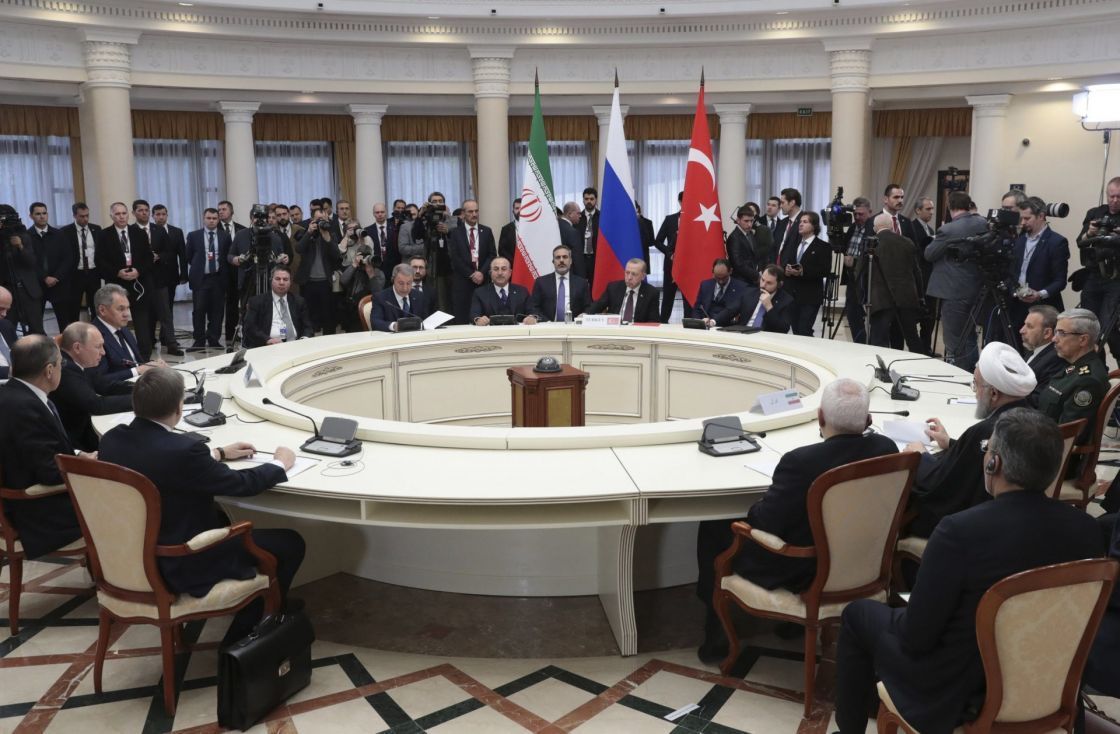- Editorials
- Posted
Kassioun Editorial 1079: Astana Summit… Proceed Forward!
Since the Syrian crisis erupted in 2011, we have argued that dialogue and a political solution are the only way out. It took a year and a half for the Geneva Communiqué to be issued in June 2012, which endorsed the principle of a political solution, but the battles on the ground continued and escalated. Then, more years passed until UNSC Resolution 2254 was adopted at the end of 2015, which laid out the map for the solution and became an important turning point, not only at the Syrian level, but also at the international level as an indication of the beginning of an actual entry into the new international balance stage. Despite that, ending the military operations did not succeed until a qualitatively new international-regional process was formed, which is the Astana process that emerged at the end of 2016, and was not able to end the conflict in its military form until mid-2019.
Since then, the political solution and Resolution 2254 were placed in the recovery unit, under the name of the Constitutional Committee. The West, which hypocritically agreed to both the Geneva Communiqué and 2254, worked on the ground all along against what is needed for them, the same as it did with the Minsk Accords. That is, the West worked on gaining time within a process of comprehensive destruction of Syria, militarily in the first phase, then economically in the second phase, all the way to bulldozing Syrians out of their land and bringing them to the brink of doom as a people and country.
In parallel, the contribution of the extremists, the dominant war lords, and the big corruption figures from the Syrian sides was no less catastrophic and destructive than the Western contribution. Rather, it actually was as an extension of that role and as an arm thereof, starting with rejecting a political solution under the slogans of “military elimination” and “toppling”, all the way to verbally accepting while destroying it in practice.
Establishing the Constitutional Committee, starting with the Sochi Conference, was not intended to replace 2254, but rather to keep the latter alive until there is an international and regional circumstance that would allow bypassing the Western obstruction. The essence of 2254 was, and still is, represented by three elements: the first is the transitional period and implicitly the transitional body, the second is the constitution, and the third is elections.
Although the Constitutional Committee was never the solution, it could have performed a greater function than just keeping the political solution alive if there had been political will by the Syrian sides. Perhaps one of the most prominent indications of the absence of that will is not only removing the Moscow platform from the small group of the Committee, but more importantly trying to exclude its opinion, which said that the Committee needs three main amendments: the composition to include those who are excluded, the venue gets moved to Damascus with the necessary guarantees, and the meetings be public and get broadcast live to Syrians. These amendments would have turned the Committee into a real key to a solution.
After eight meetings of the Committee, during which the gender of angels was discussed more than was discussed in Byzantium, and after the cancellation of the ninth meeting, it became clear that the Committee, in its current form, composition, and modus operandi, had reached its logical conclusion.
Some may be pleased with this, under the illusion that this means the political solution itself will end with it, but such a view is absolutely shortsighted and narrow-minded.
The fact of the matter is that, as we said with the onset of the Ukrainian crisis, the political solution will be expedited and accelerated, not postponed or killed. The international balance that prevented the solution is precisely what is being changed today, and what has already been changed, to a large extent.
As the headline of Kassioun’s editorial was two weeks ago: “It is the Astana Group’s Turn!”, the heads of state of which will hold their summit next Tuesday in Tehran, in which they will be required to publicly take the lead in implementing 2254, whether the West agrees or refuses. The international circumstance has fully matured, especially after the American-Zionist failure expressed in Biden’s last visit.


